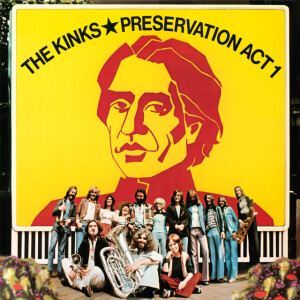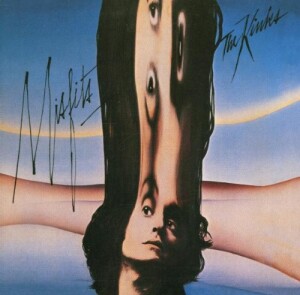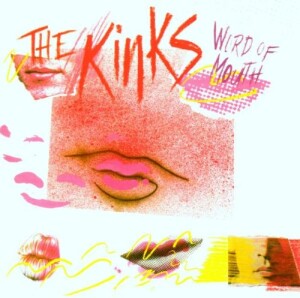 The Kinks’ Preservation Act 1 (Konk/Koch Records, 2004, originally released 1973)
The Kinks’ Preservation Act 1 (Konk/Koch Records, 2004, originally released 1973)
The Kinks’ Preservation Act 2 (Konk/Koch Records, 2004, originally released 1974)
The Kinks’ A Soap Opera (Konk/Koch Records, 2004, originally released 1975)
The Kinks’ Sleepwalker (Konk/Koch Records, 2004, originally released 1977)
The Kinks’ Misfits (Konk/Koch Records, 2004, originally released 1978)
The Kinks’ One For the Road (Konk/Koch Records, 2004, originally released 1980)
The Kinks’ Give the People What They Want (Konk/Koch Records, 2004, originally released 1981)
The Kinks’ State of Confusion (Konk/Koch Records, 2004, originally released 1983)
The Kinks’ Word of Mouth (Konk/Koch Records, 2004, originally released 1984)
British Invasion! 1964! The Beatles! The Rolling Stones! The Animals! The Kinks! Aah, the Kinks. Mick Avory on drums. Peter Quaife on bass. Dave Davies, the inventor of heavy metal guitar. And Head Kink Raymond Douglas Davies, rhythm guitar, lead vocals, and songwriting genius.
Aye! Wot a @#$%in’ band! They wuz our idols. We wanted to sound like them early @#$%in’ Kinks. “All Day and All of the Night,” “You Really Got Me!” “Tired of Waitin'” Fantastic!
SPike…this isn’t a collection of those early Pye records. Those songs don’t really appear on any of these CDs (well, except on the live one) … these are the RCA and Arista albums from the 70s and 80s.
Wot!? @#$%! Wots on it then? Disco?
Not disco, but it’s mid-period Kinks so you have to make a few allowances.
(SPike mostly grumbles for the rest of this discussion. I will not show his remarks, except when he utters particularly pithy comments.)
What separated the Kinks from the rest of the British Invasion were the songs of Ray Davies. While his peers were writing about love and lust Davies focused on the British middle class. His lyrics describing the “Carnaby-tian army” in their fancy duds, the “Waterloo Sunsets,” and “Sunny Afternoon[s]” used satire and wit, and a fair dollop of charm to lift them from the mass of blues-based rock. And the power chords of brother Dave helped!
Oh, aye, they @#$%in’ DID!
By the time the 70s rolled around, Ray had written the pastoral rock classic The Kinks are The Village Green Preservation Society (at which time Pete Quaife left, to be replaced by John Dalton on bass) and the song score for a television presentation Arthur or the Decline and Fall of the British Empire (an album filled with wistful memories and powerful rock). These were followed by Lola Versus Powerman and the Moneygoround (with its hit song “Lola” with the wonderful key line, “… I’m glad I’m a man, and so is Lola!”) (Is Lola glad Ray’s a man? Or is [s]he also glad to be a man? You figure it out!) John Gosling joined to add another dimension to the music with his keyboards. The Kinks left Pye for RCA, put out the moderately well received Muswell Hillbillies (also included in Konk/Koch’s re-issue series, but not in the package we received) and the dud Everybody’s in Show Business. The loud guitars were giving way to acoustics, and Raymond’s theatrical leanings were taking over. But a Kinks’ album always has something worth listening to.
I don’t know, Dave! I’ve ‘eard that Show Business record, an’ wot exackly do you fink is worf list’nin’ to on there?
 Well, SPike, fortunately … we don’t have to review THAT one! Ray Davies took the themes of Village Green Preservation Society expanded on them over three vinyl albums. Six sides! One album called Preservation Act 1 and two further records in the double album Preservation Act 2.
Well, SPike, fortunately … we don’t have to review THAT one! Ray Davies took the themes of Village Green Preservation Society expanded on them over three vinyl albums. Six sides! One album called Preservation Act 1 and two further records in the double album Preservation Act 2.
Act 1 starts off with a riff, borrowed from Jimi Hendrix, but played like Dave Davies, and an introductory song not included on the original album, “Preservation.” It says it was a single, but I don’t remember hearing it on the radio. The Kinks weren’t getting much airplay by 1973. These concept albums were too much for radio station playlists, so they simply ignored them. The song rocks, and does provide a thematic setup for the album to come. By this time the five Kinks were joined by a horn section consisting of Alan Holmes (sax), Laurie Brown (trumpet) and John Beechum (trombone), as well as a bunch of backup singers. The chorus sings the first song proper, “Morning Song,” a melancholy chant, and the kind of thing that longtime Davies admirers were frustrated by. “Daylight” sounds like it was lifted right off a Broadway stage, except it has Ray’s familiar voice backed by the chorus, and some tuba lines!
Characters appear, The Tramp, Working Class Man, Middle Class Man, Upper Class Man, Johnny Thunder, Mr. Black, Scared Housewives, and of course Flash. The liner notes contend that this is the “biggest rock musical that any artist had ever conceived,” and claimed it (with Act 2) to be “the fulfilment of a venture as grandiose as anything in pop history.” Maybe so. But was it rock and roll?
It most certainly wuz not!
It most certainly was not, you’re correct SPike. I’m sure that if you sat down and worked through the two CDs carefully listening to the lyrics you could figure out the “essential drama” that existed here, but for most listeners … most Kinks’ fans … you just want to skip past the theatrical stuff to get to the odd rockin’ track. “One of the Survivors” fairly rocks, and it seems like the first song (track 7) where you can hear Dave’s guitar! Not that the sound isn’t great, especially in these new SACD remastered version! Those tubas sound really hornlike!
 A Soap Opera looks a bit frightening. The cover and the title seem to promise more of the same. Theatrical, conceptual, three wall-hanging ducks, and a play on Michelangelo’s Sistine Chapel God’s hand to man’s hand. However the first thing you hear is Dave’s raw guitar, riffing like the Kinks of old. “Everyone’s a Star!” Then “Ordinary People” begins, with narration from Ray in his huckster voice, “I can make ANYone a star!” So it IS a concept album. But there’s a lot more rocking going on here. And the classic “Ducks on the Wall” makes this one a must have!
A Soap Opera looks a bit frightening. The cover and the title seem to promise more of the same. Theatrical, conceptual, three wall-hanging ducks, and a play on Michelangelo’s Sistine Chapel God’s hand to man’s hand. However the first thing you hear is Dave’s raw guitar, riffing like the Kinks of old. “Everyone’s a Star!” Then “Ordinary People” begins, with narration from Ray in his huckster voice, “I can make ANYone a star!” So it IS a concept album. But there’s a lot more rocking going on here. And the classic “Ducks on the Wall” makes this one a must have!
I really gotta say … Dave’s already got all these records … on vinyl. I wuz checkin’ the archives an’ sure ’nuff there they are. Must say the packages were much nicer biggy-sized!
Soap Opera was followed the same year by yet another concept album entitled Schoolboys in Disgrace. I think I sold my vinyl copy of that one because it was a failure and I rarely listened to it. I kept Soap Opera mainly due to “Ducks On the Wall” because my Nana HAD three ducks on her wall. It just seemed an undeniable link between me and the Davies boys! RCA got a bit tired of these uncommercial records and let the contract slide. The Kinks moved over to Arista Records and celebrated the new deal with the most commercial, tight, rockin’ album they had made in years. I recall seeing them promoting Sleepwalker on “Saturday Night Live,” and the following Monday I ran down to the record shop to buy it!
Sleepwalker starts slowly, then the guitar kicks in, the tempo increases and here comes Ray’s real rock voice. Is this about rambling or is it about “Life on the Road” as lived by the Kinks? Well…both really. And it sounds beautiful. The horns are gone, The Kinks are reduced to a five piece band again. The songs are tight, catchy, and the lyrics self-contained and as pithy as ever. “Mr Big Man,” “Sleepwalker,” “Juke Box Music,” the songs still tell stories, but the stories are smaller, self-contained, and somehow they are more successful because of it. Some writers write novels, and some write short stories. To my mind James Joyce peaked as a writer of short stories, and if you read Ulysses as a series of linked short tales, you’ll find it much easier to work through. I think of Ray Davies in the same way. In a three-minute pop song he can create an entire world of character, and emotion far more powerfully than when he tries to stretch it out over two records. Sleepwalker is a true return to form.
1978’s Misfits continued the focused approach to songwriting and added to the success of the band. I saw The Kinks live during this era and they did a brief medley of Schoolboys In Disgrace but the rest of the show was a potent cruise through the hits, and the newer songs fit right in beside the classics. Ray couldn’t help being theatrical … he camped it up wonderfully. One of the best shows I’ve ever seen. They even had a Top 30 hit from Misfits, first one in years, with “Rock’n’Roll Fantasy.” It must have been getting frustrating for the band though, especially for Dave a fine songwriter himself, and one of the true guitar greats. The album covers showed images of Ray alone, no band shots except inside. Sure they are written and produced by Raymond Douglas Davies, but Dave Davies has always been a big part of the overall sound, and drummer Mick Avory had been along since the beginning. A session drummer fills in for Avory on three Misfits tracks.
“I always shun the idea that I might be accepted, because maybe if I was, I’d stop searching. I want the right to change.” Ray Davies said these words in a Newsweek interview in June ’78. And change he has continued to do throughout his whole career. From three minute singles to ninety minute concept albums, from television shows to stage shows, and on into the writing of two books, Raymond Douglas Davis has shown himself to be a renaissance man. His first book was a strange autobiography entitled X-Ray which appeared in 1994; it was followed three years later by a collection of rock inspired fiction Waterloo Sunset. The books essentially carried on the themes which had shaped his songs for his whole career. And these themes can be seen in the songs on Misfits too.
Hello you, hello me, hello people we used to be
Isn’t it strange we never changed
We’ve been through it all yet we’re still the same
And I know it’s a miracle, we still go and for all I know
We might still have a way to go… ~”A Rock’n’Roll Fantasy”
The movement from the past to the present, hope for the future but a desire for those older things which grounded us as children, Davies’ songs are filled with yearning.
Too bad the next Kinks album wasn’t included. It wuz Low Budget an’ wuz really the first punk band payin’ tribute to bein’ a punk band. Great, loud, raunchy rock’n’roll!
Next up is the double live album One For the Road from 1980. Contemporary version of the classics mixed with live versions of the best songs from the 70s’ albums. It’s aggressive, loud, and unpolished. The Kinks play tricks starting off with the opening chords of “You Really Got Me” which then blend into an instrumental version of the song which does nothing except make you hope they play it straight later on! “The Hard Way” is the first song proper, two minutes forty-two seconds of rock … that’s more like it. “Catch Me Now I’m Fallin'” borrows a riff from the Stones, adds Captain America, and plenty of energy. Dave’s guitar solo is a highlight, as usual. “Where Have All the Good Times Gone?” “Lola,” “All Day and All Of The Night,” “”Stop Your Sobbing,” “Til the End of the Day,” “Victoria,” “David Watts.” They race through the songs as if there’s a time limit on them. Then you realize … these songs are timeless!
@#$%in’ right! But ‘at’s all yer gonna say ’bout this album? This an’ Low Budget wuz like the only records by old fart bands that we could stand, Fred an’ I. We worshipped these guys. Ray and Dave Davies they’re like @#$%in’ geniuses!
According to the liner notes for Give the People What They Want the Davies Brothers were just discovering that younger fans…like you SPike…where making up their audience. “The look on [Ray] Davies’ face was priceless as he looked into the face of the Kinks’ new audience–a fanatical, hard rock crowd nurtured in an era that, in one reflexive spasm, had corporatized the music community, inspired punk and somehow gave the Kinks an opportunity to cultivate the sizable audiences they so richly deserved. The kid recognized Davies as the single approachable rock legend, one who could articulate the absurdities of his business at one end of a hockey arena without sacrificing the hilarity or the anarchic energy necessary to project it to the cheap seats.” Hmm. Yes, each of these SACD reissues has new liner notes prepared by Matt Resnicoff, Fred Schruers, John Swenson, Peter Doggett or Dawn Eden; and all lyrics, notes, and assorted contemporary photos round out the packages. Oh, and there are bonus tracks included on all the albums, leftover songs, non-album singles, and edits … which make these versions even more valuable!
I thought we wuz talkin’ ’bout Give the People What They Want!!!
And we are, SPike, settle down! On this album Ray continued to deal with life in a rock band as one of his favourite themes. The sound of radio stations flash by, then Dave’s guitar, and Ray’s voice …
Radios of the world are tuning in tonight
are you on the dial, are you tuned in right?
one of our DJs is missing
are you listening?
are you listening to me?
can you hear me?
can you hear me clearly?
around the dial.
The song goes through a few changes in tempo and tone, from Beach Boy harmonies to that raw Kinks sound…it’s a keeper. The rest of the album is similar, and just acts as one more stop on the way to rock’n’roll heaven.
Two years later State of Confusion came along and provided a couple hit singles for Ray and the boys. Okay…they were definitely MEN by that point. But they were still rocking harder than many of their contemporaries. You can hear the Music Hall influences, the pastoral yearning, the true “British” sound that no band did better than the Kinks. “Come Dancing” and “Don’t Forget to Dance” received plenty of airplay, and had accompanying videos too. And then in 1984, the last Kinks album recorded for Arista, Word of Mouth, sounds a bit tired. I bought it on vinyl when it first came out, and I think I played it once before putting it into the archives. It sounds better on this new version, but it’s only a shadow of the earlier albums. They would move to MCA, then to Columbia, and then release a double unplugged career covering set for Konk Records. Their albums became harder to find. You had to look for them. Order them. In short months you might even be able to pick them up in delete bins. But these re-issues from the 70s and 80s tell a tale of a band whose vision and ambition was always bigger than the music business could accommodate. There is such a wealth of material here…that another thousand words wouldn’t begin to pay tribute to the overall quality and downright rackability of it. Start in the middle and work out to both ends. Or try getting into the theatrical material first and then progressing through the reawakening rockers. Or if you only want one album…well…I can’t pick just one. You’d need at least five! The Kinks NEED to be in your record collection.
Yeah, mebbe five but ya gotta get the live one, One For The Road … it @#$%in’ ROCKS!
